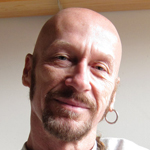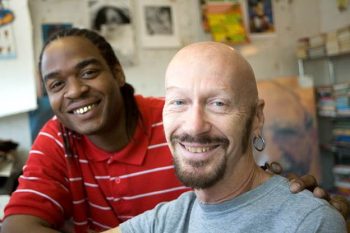
Bob Hansman, Associate Professor of Architecture, Sam Fox School of Design & Visual Arts
Two months ago I had a nice apartment in Chicago. I had a good job. I had a son. When something happened to the Negroes in the South I said, “That’s their business, not mine.” Now I know how wrong I was. The murder of my son has shown me that what happens to any of us, anywhere in the world, had better be the business of us all.
— Mamie Till, 1955
I began thinking about this article during the period between Mike Brown’s funeral (which I attended — one of a handful of white people) and the November 24, 2014 non-indictment of Darren Wilson. As each subsequent event unfolded, I found myself revisiting what I had thought, what I had planned to write. Some things became clearer to me, others less so. Some of my earlier thinking was reinforced, some was challenged — or it expanded to include more question and nuance, and even contradiction and paradox, until my thinking belonged to me, and only me, and matched no one’s ideology.
The one person whose thinking my own thinking generally matched was my son.
I am a white man with a Black son. I did not have or get him young and fill his head with illusions of diversity and colorblindness, the way some white parents do. I met him when he was a young teen, living in the housing projects, well on his way to having a reality-based world view built around the urban litany of poverty, gangs, drugs, murder, jail, dysfunctional schools and police abuse — and very much not about diversity and colorblindness.
I grew up in St. Louis and, except for a few years elsewhere in the Midwest, have lived here my whole life. My family was of the generation that moved out of the City via the GI Bill: my parents first, then my grandparents, though we still, for a time, anyway, had friends and family back in the City. But after a few decades, everyone in the family had left the City for the county – or for smaller towns, more homogenous towns, farms, lakes, mountains. Almost alone among my family peers, I returned to the City, dismayed and mystified that our families had ever left it, and dismayed at what that leaving had wrought for those who did not or could not leave.
Years later — a quarter century ago now — and through a wholly unexpected chain of events, I came to be a professor at Washington University in St. Louis, which actually straddles the City and two counties.
Not long after starting at Washington University, and through an equally unexpected chain of events, I found myself teaching a summer art program in the Clinton-Peabody housing projects just south of downtown. This was, in retrospect, the summer when St. Louis’ murder rate was at its highest, the crack wars were peaking, and the projects I was in were largely controlled by Bloods, with a substantial presence of Crips on the western edge. There was a murder the first week I was down there.
Almost immediately, those two threads of my life — the University and the projects — began to intertwine.
The other major intertwining would be between my personal and professional lives. Far from crashing and burning, as expected, the summer art program took root; the next summer I was back, and during the rest of the year I spent more and more time there, as well. Just as the third summer was about to get under way, Jermaine Roberts, the boy I had become closest to — the boy who was my bridge to the other students, the boy who, I said repeatedly, I wished I had a son just like — died.
In the wake of that, one of the moms, who understood instinctively the depth of my grief and how lost I was without Jermaine, suggested I move into the projects with them. And Jovan, one of the other boys, who looked to Jermaine for the family he wished he had, and who was lost without him, asked to move in with me. My personal and professional lives fused. In many ways, instead of ending, life began then.
Eventually, at his initiative, I adopted Jovan. He is now 34, and running the program he was in as a child. But in the intervening years, he and I grew alongside each other, navigating the world and each other’s worlds, which increasingly came to be the same. I learned firsthand the nauseating fear that the parents of young Black men live with every time they walk out the door. And Jovan, in turn, taught me how to navigate my own anger, how to keep my outrage in check, how to keep from getting myself hauled off to jail.
We endured frequent stops by police who assumed we were a drug deal in progress, not a father and son, and who, when we tried to explain our relationship, told us, “You don’t have to get smart with me.” One time Jovan had an art opening a few blocks from our home; he never made it to his own opening, spending it instead on the sidewalk, handcuffed, while police ran checks. Another time police surrounded me in the projects, paddy wagon and all, cursing obscenities at me and threatening to “find something” in my car if I didn’t shut up. After I testified to the Board of Aldermen about police abuse, some of my kids in the program were targeted.
Our relationship with the police in the projects has changed, for the better. We still have to endure (and survive) the newbies, who get assigned there and have to act out all their own fantasies at our expense. But we now have the older police to protect us from the younger ones.
In any event, together, Jovan and I got him and me through his teen years, the years that Michael Brown would not live through.
Read full article on Solidarity
